- Home
- Kate Quinn
The Rose Code Page 2
The Rose Code Read online
Page 2
Not that Mab had any fantasies about dukes in disguise or millionaires with Mediterranean yachts—life wasn’t a novel like Rebecca. No mysterious moneyed hero was going to swoop a Shoreditch girl off her feet, no matter how well-read. But a gentleman, some nice, comfortable man with a decent education and a good profession—yes, a husband like that was within reach. He was out there. Mab just had to meet him.
“Mab!” Her mother shook her head, amused. “Who d’you think you are, then?”
“Someone who can do better than Mabel.”
“You and your better. What’s good enough for the rest of us isn’t good enough for you?”
No, Mab thought, knowing better than to say so, because she’d come to learn that people didn’t like your wanting more than you had. She’d grown up fifth of six children all crammed together in this cramped flat that smelled of fried onions and regret, a toilet that had to be shared with two other families—she’d be damned if she’d ever be ashamed of it, but she’d be doubly damned if it was enough. Was it such a terrible thing, wanting to do more than work in a factory until you got married? Wanting more in a husband than one of the local factory workers, who would probably drink too much and eventually run out altogether like Mab’s dad? Mab never tried to tell her family they could make more of themselves; it was fine with her if they were happy with what they had, so why couldn’t they leave her alone?
“You think you’re too good to work?” Mum had demanded when Mab protested leaving school at fourteen. “All these kids around and your father gone—”
“I’m not too good to work,” Mab had flashed back. “But I’m going to work for something.” Even at fourteen, laboring at the grocer’s and dodging the clerks who pinched her bum, she’d been looking ahead. She got a clerk’s post and studied how the better customers talked and dressed. She learned how to carry herself, how to look people in the eye. After a year’s scrutiny of the girls who worked the counters at Selfridges, she walked through those double doors on Oxford Street in a cheap suit and good shoes that had taken half a year’s wages, and landed herself a job selling powder compacts and scent. “Aren’t you lucky,” Mum had said, as if it hadn’t taken any work at all.
And Mab wasn’t done yet, not by a long shot. She’d just finished a scrimped-for secretarial course, and by the time she turned twenty-two early next year she intended to be sitting behind some shiny desk, taking dictation and surrounded by people who said “Good morning, Miss Churt” instead of “Oi, Mabel!”
“What are you going to do with all that planning?” her mother asked. “Get yourself a fancy boyfriend to pick up the tab for a few dinners?”
“I’ve no interest in fancy boyfriends.” As far as Mab was concerned, love stories were for novels. Love wasn’t the point—even marriage wasn’t the point, not really. A good husband might have been the fastest way up the ladder toward safety and prosperity, but it wasn’t the only way. Better to live an old maid with a shiny desk and a salary in the bank, proudly achieved through the sweat of her own efforts, than end up disappointed and old before her time thanks to long factory hours and too much childbirth.
Anything was better than that.
Mab glanced at the clock. Time for work. “Give me a kiss, Luce. How’s that finger?” Mab examined the upheld knuckle where Lucy had run a splinter yesterday. “Good as new. Goodness, you’re grubby . . .” Wiping Lucy’s cheeks with a fresh handkerchief.
“A little dirt never hurt anyone,” Mrs. Churt said.
“I’ll draw you a bath when I get home.” Mab kissed Lucy, fighting irritation at her mother. She’s tired, that’s all. Mab still winced to remember how furious Mum had been, enduring such a late addition to a family that already boasted five children. “I’m too old to be chasing after babies,” Mum had sighed, watching Lucy crawl about the floor like a crab. Still, there hadn’t exactly been anything they could do about it except manage.
For a little while longer, anyway, Mab thought. If she landed a good husband she’d wheedle him into helping her sister, so Lucy would never have to leave school for a job at fourteen. If he’d give her that, Mab would never ask for anything else.
Cold slapped her cheeks as she hurried out of the flat into the street. Five days until Christmas, but no snow yet. Two girls in Auxiliary Territorial Service uniforms hurried past, and Mab wondered where she’d sign up if service became compulsory . . .
“Fancy a walk, darling?” A fellow in RAF uniform fell into step beside her. “I’m on leave, show a fellow a good time.”
Mab shot him the glance she’d perfected at fourteen, a ferocious stare leveled from below very straight, very black brows, then sped her pace. You could join the WAAF, she thought, reminded by the fellow’s uniform that the Royal Air Force had a Women’s Auxiliary branch. Better than being a Land Girl, stuck shoveling cow shit in Yorkshire.
“Come on, that’s no way to treat a man going to war. Let's have a kiss . . .”
He sneaked an arm around her waist, squeezing. Mab smelled beer, hair cream, and an ugly flicker of memory pushed upward. She shoved it down, fast, and her voice came out more of a snarl than she intended. “Bugger off—” And she kicked the pilot in the shins with swift, hard efficiency. He yelped, staggering on the icy cobbles. Mab pried his hand off her hip and headed for the Tube, ignoring the things he called after her, shaking off the shiver of memory. Silver linings—the streets might have been full of handsy soldiers, but plenty of soldiers wanted to take a girl to the altar, not just to bed. If there was anything war brought in its wake, it was hasty weddings. Mab had already seen it in Shoreditch: brides saying their vows without even waiting for a secondhand wedding dress, anything to get that ring on their finger before their fiancés went off to fight. And well-read gentlemen rushed off to war every bit as fast as Shoreditch men. Mab certainly wasn’t going to call the war a good thing—she’d read her Wilfred Owen and Francis Gray, even if war poetry had been deemed too indelicate for “100 Classic Literary Works for the Well-Read Lady.” But she’d have had to be an idiot not to realize that war was going to change her world beyond rationing.
Maybe she wouldn’t need to get a secretarial post after all. Could there be war work somewhere in London for a girl who’d come tops in typing and shorthand, some post where Mab could do her part for king and country, meet a nice man or two, and look after her family?
A shop door banged open, releasing brief strains of “The Holly and the Ivy” from a radio inside. By Christmas of 1940, Mab thought, things might be entirely different. This year, things had to change.
War meant change.
Chapter 2
I need a job. It had been Osla’s first thought, returning to England at the end of ’39.
“Darling, aren’t you supposed to be in Montreal?” her friend Sally Norton had exclaimed. Osla and the Honorable Sarah Norton shared a godfather and had been presented at court a Season apart; Sally had been the first person Osla telephoned when she stepped back on English soil. “I thought your mother shipped you off to the cousins when war broke out.”
“Sal, do you think anything was going to keep me from finagling my way home?” It had taken Osla six weeks, seething and furious, to scheme an escape after her mother had shipped her to Montreal. Some shameless flirtation with a few influential men for travel permits, some creative fibbing to her Canadian cousins, a tiny bit of fraud—that air ticket from Montreal to Lisbon had been much better off with Osla than its original owner—and a boat ride out of Portugal later, voilà. “Goodbye, Canada!” Osla sang, tossing her traveling case into the taxi. Osla might have been born in Montreal, but she didn’t remember anything before arriving in England at the age of four, trailing behind a recently divorced mother along with the trunks and the scandal. Canada was beautiful, but England was home. Better to be bombed at home among friends than be safe and corroding in exile.
“I need a job,” Osla told Sally. “Well, first I need a hairdresser because that horrid boat from Lisbon gave me lic
e, and I look like a dog’s dinner. Then I need a job. Mamma’s in such a pelter she’s cut off my allowance, for which I don’t blame her. Besides, we’ve got to poker up, as the Yanks might say, and do our bit for the war.” The old sceptred isle in her hour of need, and so forth. You couldn’t be booted out of as many boarding schools as Osla Kendall without picking up a good bit of Shakespeare.
“The Wrens—”
“Don’t talk slush, Sal, everyone expects girls like us to join the WRNS.” Osla had been called a silly deb enough times for it to sting—a burbling belle, a champagne Shirley, a mindless Mayfair muffin. Well, this Mayfair muffin was going to show everyone a society girl could get her hands dirty. “Let’s join the Land Army. Or make airplanes, how about that?”
“Do you know anything about making airplanes?” Sally had laughed, echoing the dubious labor superintendent at the Hawker Siddeley factory in Colnbrook, where they applied several days later.
“I know how to take the rotor arm off an automobile to save it being stolen by Huns if we get invaded,” Osla retorted pertly. And in no time at all she was clapped into a boiler suit, drilling eight hours a day in the factory training room beside fifteen other girls. Maybe it was dull work but she was earning a wage, living independently for the first time in her life.
“I thought we’d be working on Spitfires and flirting with pilots,” Sally complained across the workbench on New Year’s Eve. “Not just drilling, drilling, drilling.”
“No grousing,” the instructor warned, overhearing. “There’s a war on, you know!”
Everyone was saying that now, Osla had observed. Milk run out? There’s a war on! Ladder in your stockings? There’s a war on!
“Don’t tell me you don’t despise this stuff,” Sally muttered, banging her Dural sheet, and Osla eyed her own with loathing. Dural made the outer skins for the Hurricanes flown by RAF squadrons (if RAF squadrons actually flew any missions in this war where nothing yet was happening), and Osla had spent the last two months learning to drill it, file it, and pot-rivet it. The metal fought and spat and gave off shavings that clogged her hair and nose so thickly her bathwater turned gray. She hadn’t known it was possible to cherish a hatred this profound for a metal alloy, but there you were.
“You’d better save some swoony RAF pilot’s life when you’re finally slapped onto the side of a Hurricane,” she told the sheet, leveling her drill at it like a gunslinger in a cowboy film.
“Thank God we got tonight off for New Year’s,” Sally said when the clock finally ticked over to six in the evening and everyone streamed for the doors. “What dress did you bring?”
“The green satin. I can slither into it at my mother’s suite at Claridge’s.”
“She’s forgiven you for bunking out of Montreal?”
“More or less. She’s chuffed about everything these days because she’s got a new beau.” Osla just hoped he wouldn’t be stepfather number four.
“Speaking of admirers, there’s a gorgeous fellow I promised to introduce you to.” Sally threw Osla an arch look. “He’s the goods.”
“He’d better be dark. Blond men simply aren’t to be trusted.”
They pelted laughing through the factory gate toward the road. With only twenty-four hours off every eighth day, there was no point wasting a minute of those precious hours heading back to their digs; they hitched a ride straight into London in an ancient Alvis, its headlights fitted with slotted masks to meet blackout regulations, driven by a pair of lieutenants who were already absolutely kippered. They were all singing “Anything Goes” by the time the Alvis pulled up at Claridge’s, and as Sally lingered to flirt, Osla skipped up the front steps toward the hall porter who for years had been a sort of butler, uncle, and social secretary combined. “Hello, Mr. Gibbs.”
“Good evening, Miss Kendall. You’re in town with Miss Norton? Lord Hartington was asking after her.”
Osla lowered her voice. “Sally’s fixing me up with someone. Did she give you a hint?”
“She did indeed. He’s inside—Main Lounge, Royal Navy cadet uniform.” Mr. Gibbs looked judicious. “Shall I tell him you’ll be down in an hour, once you’ve changed?”
“If he doesn’t love me in a boiler suit, he’s not worth dressing up for in the first place.” Sally came dashing up and started interrogating Gibbs about Billy Hartington, and Osla sauntered inside. She rather enjoyed the stuffy looks from men in their evening tails and women in their satin gowns as she breezed over the art deco floors in a grubby boiler suit. Look at me! she wanted to shout. I’ve just finished an eight-hour day in an airplane factory and now I’m going to do the conga round the Café de Paris until dawn. Look at me, Osla Kendall, eighteen years old and finally useful.
She spotted him at the bar in his cadet uniform, turned away so she couldn’t see his face. “You wouldn’t happen to be my date, would you?” Osla asked that set of rather splendid shoulders. “Mr. Gibbs says you are, and anybody who’s ever been to Claridge’s knows Mr. Gibbs is never wrong.”
He turned, and Osla’s first thought was, Sally, you rat, you might have warned me! Actually, that was her second thought. Osla’s first thought was that even though she’d never met him, she knew exactly who he was. She’d seen his name in the Tatler and the Bystander; she knew who his family was and the degree to which he was related to the king. She knew he was exactly her age, was a cadet at Dartmouth, and had returned from Athens at the king’s request when war broke out.
“You must be Osla Kendall,” said Prince Philip of Greece.
“Must I?” She repressed the urge to pat at her hair. If she’d known she had a date with a prince, she would have taken a moment to brush the Dural shavings out of her curls.
“Mr. Gibbs said you’d be along right about now, and Mr. Gibbs is never wrong.” The prince leaned against the bar, tanned golden, hair glinting like a coin, eyes very blue and direct. He took in her dirty boiler suit and gave a slow grin. Oh, my, Osla thought. That’s a smile. “Absolutely smashing getup,” he said. “Is that what all the girls are wearing this season?”
“It’s what Osla Kendall is wearing this season.” She struck a magazine pose, refusing to regret the green satin gown in her bag. “I will not be confined within the weak lists of a country’s fashions—”
“Henry V,” he said promptly.
“Oooh, you know your Shakespeare.”
“They crammed a bit into me at Gordonstoun.” He nodded at the bartender, and a wide-brimmed coupe frothing with champagne materialized at Osla’s elbow. “In between all the hiking and sailing.”
“Of course you sail—”
“Why ‘of course’?”
“You look like a Viking; you must have put some time in on an oar or two. Have you got a longship parked round the corner?”
“My uncle Dickie’s Vauxhall. Sorry to disappoint.”
“I see you two are getting along,” Sally laughed, slipping up beside them. “Os, our godfather”—Lord Mountbatten—“is Phil’s uncle, so that’s the connection. Uncle Dickie said Phil didn’t know anyone in London, and did I know a nice girl who could squire him around—”
“A nice girl,” Osla groaned, taking a slug of champagne. “There’s nothing more deadly than being called nice.”
“I don’t think you’re nice,” the prince said.
“Don’t you say the sweetest things?” Tipping her head back. “What am I, then?”
“The prettiest thing I’ve ever seen in a boiler suit.”
“You should see me pot-rivet a seam.”
“Anytime, princess.”
“Are we going dancing or not?” Sally complained. “Come upstairs and change, Os!”
Prince Philip looked speculative. “If I made you a dare—”
“Careful,” Osla warned. “I don’t back down from dares.”
“She’s famous for it,” Sally agreed. “At Miss Fenton’s, the upper-form girls dared her to put itching powder in the headmistress’s knickers.”
Phi
lip looked down at Osla from his full six feet, grinning again. “Did you do it?”
“Of course. Then I stole her suspender belt, climbed the chapel roof, and hung it from the cross. She kicked up quite a shindy over that. What’s your dare?”
“Come out dancing as you are,” the prince challenged. “Don’t change into whatever satin thing you’ve got in that bag.”
“You’re on.” Osla tossed down the rest of her champagne, and they piled laughing out of the Main Lounge. Mr. Gibbs gave Osla a wink as he opened the doors. She took one gulp of the icy, starry night outside—you could see stars all over London now, with the blackout—and looked over her shoulder at Prince Philip, who had paused to tilt his head up, too. She felt the champagne fizzing in her blood and reached into her pack. “Am I allowed to wear these?” She pulled out her dancing shoes: green satin sandals with glitters of diamanté. “A princess can’t conga without her glass slippers.”
“I’ll allow it.” Prince Philip tugged the sandals away, then picked up her hand and placed it on his shoulder. “Steady . . .” And he knelt down right there on the front steps of Claridge’s to undo Osla’s boots, waiting for her to step out of them, then peeling off her wool socks. He slid her satin sandals on, tanned fingers dark against her white ankles in the faint moonlight. He looked up then, eyes shadowed.
“Oh, seriously.” Osla grinned down at him. “How many girls have you tried this on, sailor?”
He was laughing too, unable to hold his intent expression. He laughed so hard he nearly toppled over, forehead coming for a moment against Osla’s knee, and she touched his bright hair. His fingers were still braceleted around her ankle, warm in the cold night. She saw how passersby were staring at the girl in the boiler suit on the front steps of Mayfair’s best hotel, the man in naval uniform on one knee before her, and gave Philip’s shoulder a playful smack. “Enough swooning.”
He rose. “As you wish.”
They danced the New Year in at the Café de Paris, tripping down the lush carpeted stairs to the underground club. “I didn’t know they did the foxtrot in Greece!” Osla shouted over the blare of trombones, whirling through Philip’s hands. He was a fast, fierce dancer.

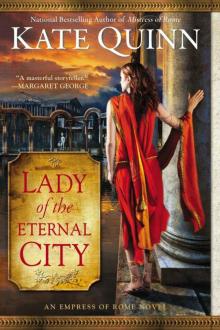 Lady of the Eternal City
Lady of the Eternal City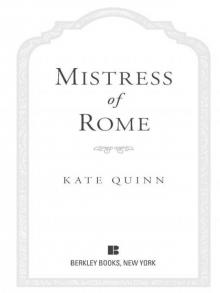 Mistress of Rome
Mistress of Rome Daughters of Rome
Daughters of Rome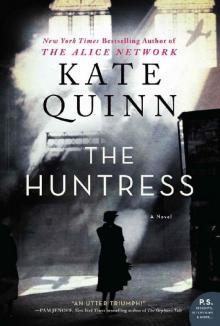 The Huntress
The Huntress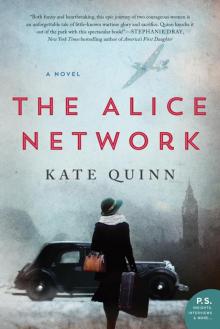 The Alice Network
The Alice Network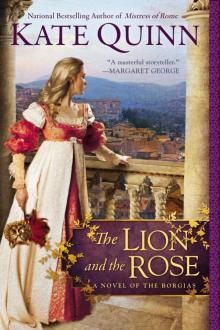 The Lion and the Rose
The Lion and the Rose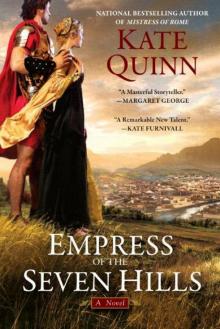 Empress of the Seven Hills
Empress of the Seven Hills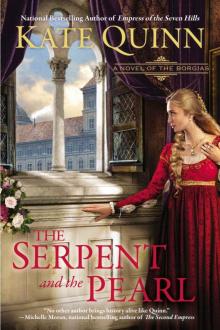 The Serpent and the Pearl
The Serpent and the Pearl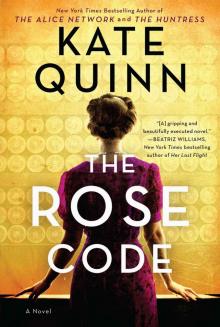 The Rose Code
The Rose Code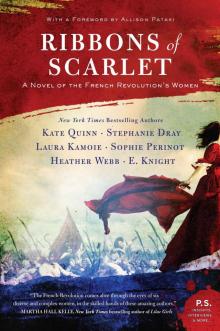 Ribbons of Scarlet
Ribbons of Scarlet A Song of War: a novel of Troy
A Song of War: a novel of Troy